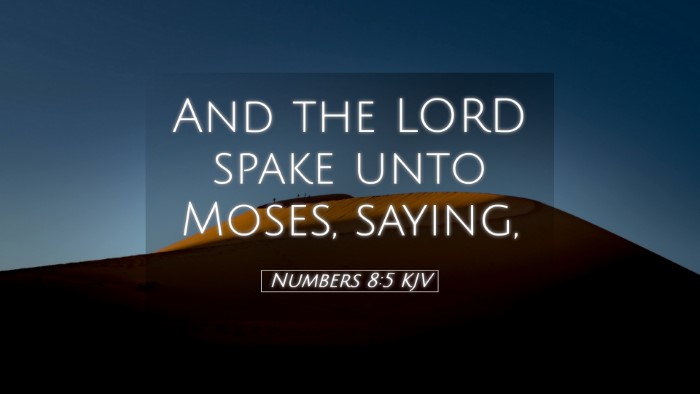Commentary on Numbers 8:5
Numbers 8:5 states: "And the LORD spake unto Moses, saying, Take the Levites from among the children of Israel, and cleanse them." This verse introduces a significant moment in the life of the Israelite community, setting the stage for the consecration and service of the Levites. The call to consecration highlights the importance of holiness and separation for service to God. Below, we examine insights from classic commentaries, focusing on the roles and responsibilities of the Levites, the significance of cleansing, and the implications for contemporary believers.
Divine Initiation
Matthew Henry emphasizes that the call of the Levites comes directly from God, reflecting His sovereign choice and divine appointment. The phrase "the LORD spake unto Moses" illustrates the importance of divine communication in the community of Israel. Henry notes that the authority vested in Moses serves to underscore the significance of the Levites’ role in maintaining the holiness of the camp.
The Role of the Levites
Both Albert Barnes and Adam Clarke expound on the unique role of the Levites. They were not merely assistants in the temple service; rather, they represented a divinely ordained tribe set apart for spiritual duties. This separation underscores a broader theological principle: that God requires a people who are holy, consecrated, and distinct from the norms of society.
- Service to God: The Levites were to assist the priests in the Temple and carry out various liturgical functions.
- Guardianship: They were tasked with protecting the holy spaces, including the tabernacle, thus maintaining the sanctity of God’s dwelling among His people.
The Process of Cleansing
The instruction to "cleanse them" is profound. Matthew Henry elaborates that cleansing symbolizes purification and readiness for service. This act involves the removal of sin and the provision of spiritual fitness for the holy tasks ahead. Henry posits that God’s demand for cleanliness extends beyond mere ritual; it signifies an inward state of holiness.
Adam Clarke adds that the cleansing process involved specific rites and sacrifices, indicating that preparation for service is not incidental but a prerequisite. Those called to minister must first be purified, reflecting the character of the God they serve.
Implications for Modern Believers
The summons of the Levites resonates with modern Christians, who are called to be a "royal priesthood" (1 Peter 2:9). As Barnes notes, all believers are set apart for God's service, implying that the principles governing the Levites' consecration can be seen as relevant to every Christian's life.
- Called to Holiness: Just as the Levites were called out, so too are Christians called to live a life reflective of God’s holiness in their everyday interactions.
- Preparation for Service: Like the Levites’ cleansing, believers are called to prepare their hearts and lives to serve within their communities and churches effectively.
Conclusion
In conclusion, Numbers 8:5 serves as a vital reminder of the importance of divine appointment, the necessity of purity, and the serious nature of ministry. The reflections from Matthew Henry, Albert Barnes, and Adam Clarke offer a rich tapestry of insights that illuminate the text's meaning for both the original audience and modern readers. Through understanding the significance of the Levites' consecration, believers today can strive to embody the holiness and dedication required of those who serve God. This passage challenges each one to assess their role as part of a holy priesthood, ever remembering the call to holiness in all aspects of life.


